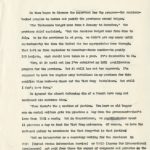1965, April 7, “Vietnamese Nationalism”
deepe
sovereign–1
april 7, 1965
(The bombing of the United States Embassy in Saigon last week announced to the Vietnamese of all political hues the introduction of an intense “Hate American” campaign by the Communist Viet Cong guerrillas and subversives. A corollary of this move is considered like likely to be the rise of Vietnamese nationalism–in either extremist or moderate doses.
“I talked with hundreds of Communist during my war here,” an elderly French colonel said recently, referring to the French Indo-China War a decade ago. “It always got down to the same thing–they said ‘we don’t want your pure water; we want our old dirty water.’ This is nationalism. We–the French–were not defeated by artillery or ambushes; we were defeated by Vietnamese nationalism and their hate of foreigners. This, too, will lead to the American defeat.”
This nationalism–the right to be Vietnamese–is now being expressed by the most anti-Communist elements in Vietnam. This is the story of one of the best, most anti-Communist chiefs of one of Vietnams forty five provinces. He is also a-typically an pro-American, having studied in the United States and speaking fluent English.)
deepe
sovereign–2
april 7, 1965
SAIGON–“You Americans should not be une fleche de paille–“a straw arrow;” the young [?] province chief explained, carefully lighting an filter cigareete . “You can not be haughty and arrogant like a Tur turkey. You must help us to increase the prestige of the Vietnamese government at and you must respect Vietnamese sovereignity .”
With great deliberation, he ordered a tasty arry of array of Chinese dishes in the noisy Vietnamese restaurant. The lively orchestra, playing Vietnamese, love songs, French love songs and American surfing melodies, nearly drowned out any attempts of at conversation. The fingers of the young province chief followed the syncopated beats by tapping on the white tablecloth–a habit he ha d learned from two years of study in the United States.
Then he continued his story, which typified the frustrations of a Vietnamese government official.
deepe
sovereign–2 3
“you Americans must work side by side with the Vietnamese government people–but the Vietnamese must always be in the forefront, leading the projects,” he explained. “This is especially true in the villages and hamlets where the people have been contaminated by Viet Cong (Communist) propaganda about the Ameri evils of the Americans. This is your official government policy–that the American government does not want to take over South Vietnam, but only wants to free it from the Communists.
“But what happens.in the provinces. In my province, all sorts of Americans go directly to the hamlets and villages–to pass out books or to inspect a project–without even consulting me, or checking in with local authorities. One day, I went to visit with an o a very poor orphanage in my province. I spotted an American who I had met before. He was sitting in his car–and didn’t even bother to get out to sa y hello. I asked him what he was doing there–without my permission and without notifying the provincial authorities he was there. I told him ‘Get out! Get out! Get out!’ You have no right be to be there.here!’ And he left.
“In another case, two drunk Americans–I suppose they were CIA–were living in a house in my provincial capital and someone threw a grenade at the h house but it didn’t explode. There was a big flap. I said who are you and what are you doing here. Even my American (military) counterpart did not know who they were. How can I as province chief possibly provide security if they don’t even notify my office if they’re in
deepe
sovereign–4
By this time, the fried rice and broiled pidgeon eggs and other Chinese delicacies arrived and the young province chief began to serve his guest. But he continued talking.
“Everyone knows the Americans ha ve a big heart and have the very best of intentions,” he explained. “But you are so innocent. You like to be flattered–and you must know the Vietnamese are the No. 1 flatterers in the world.
“Your militar
“Your America n (military) advisors are very good military technicians, but we need someone with good political brains because we are fighting the most insidious, the most politically conscious enemy of all–the Communists. But the Americans come to Vietnam with a New York mind, or an Atlanta mind, but not an o Oriental mind. One day some American advisors and I visited one of our districts and the district chief served us lunch. In our tradition, he must serve us lunch–the Americans are dying for Vietnam and the least the district chief could do was to serve lunch. But after lunch one of the American advisors gave the ch paid the district chief 200 piastres (about US$3) for the lunch. My district chief was dumbfounded; you are so innocent a nd naive and everyone was laughing at the Americans.
(More)
deepe
sovereign–5
He then began to discuss the important[importance of the?] Hoc Top program–the American-backed program to secure and pacify the provinces around Saigon.
“The Vietnamese budget runs from t January to December,” the province chief explained, “but the American budget runs from June to July. So in the provinces la st year, we didn’t get any money until September–by the time the United Sta tes appropriates came through. That left me from September to December–three months–to pacify 100 hamlets, what should have taken me a year. It’s impossible to do.
“Now, it is April and inx I’ve submitted my 1965 pacification program for the province. But it still has not been approved. I’m supposed to have two regular army battalions in my province for this pacifica tion work–to chase out the Viet Cong battalions. But still I don’t have them.”
He ignored the almost defeaning din of a French love song and continued his conversa tion .
“Then there’s the q uestion of justice. You know an old beggar man on social welfare gets two piastres a day from the government–that’s less than US$1 a month. But in theprovinces , we pay alluimmm spend 11 piastres a day to feed the Viet Cong prisoners. Of course, we have the national policy to re-educate the Viet Cong–but is that justice?
“And an interpretor or a secretary working for the Americans in USIS (United States Information Service) or USAID (Agency for International Development) get paid four times the amount of sergeants and privates on the frontline. You Americans think you can buy people’s soul with money–but you can’t and we all laugh at you.”
deepe
sovereign–6
“Everytime we have a change of government or of military leaders, we have to go back to zero and start all over again,” he continued. “Frankly, when General (Nguyen) Khanh (commander-in-chief dismissed on February 20) left we heard so many rumors that the province chiefs and division commanders would be replaced. So why should we take any risks at all? We just did nothing. Remember, we too are human. Quite frankly, I’ve asked my superiors to release me from the army.
” We now have no confidence in our leaders and we have no confidence in our future. I believe only in God. And so we must pray.”
-30-
Read Previous Article: 1965, March 3, “Fact-Finding Mission from Washington”
Read Next Article: 1965, April 29, “All-Out Campaign”






